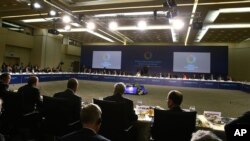Leaders from around the world gathered in Istanbul, Turkey, on Monday for a long-awaited humanitarian summit with hopes of instituting concrete protocols for dealing with future refugee crises.
The United Nations-backed summit, which began Monday and will run through Wednesday, is billed to serve as a wake-up call for action in dealing with recurrent disasters and reducing the vulnerability of developing nations.
“We have tremendous suffering in the world today. There is huge need for us to show solidarity with those who are affected by natural disasters and man-made disasters,” U.N. Deputy Secretary-General Jan Eliasson told reporters during a Sunday press conference.
More than 125 heads of state and government came together with representatives of the U.N. in host-country Turkey, which has been particularly hard hit by the ongoing migrant crisis in Europe. Turkey is currently providing refuge to around 2.7 million people fleeing the conflict in Syria, a point President Recep Tayyip Erdogan will likely emphasize as the event unfolds.
While some skeptics have voiced concerns that the event will result in little more than a well-publicized focus group, U.N. officials hope it will serve as the catalyst for change that will help ease the suffering of millions of the world’s poorest people.
"This is a once-in-a-generation opportunity to set in motion an ambitious and far-reaching agenda to change the way that we alleviate and prevent the suffering of the world's most vulnerable people," U.N. Under Secretary General for Humanitarian Affairs Stephen O'Brien said.
Among those skeptics is the medical charity Doctors without Borders, which said the event risks becoming a “fig leaf of good intentions,” with little impact in the real world.
“Summit participants, whether states or UN agencies or non-governmental organizations, will be asked to declare new and ambitious ‘commitments.’ But putting states on the same level as non-governmental organizations and UN agencies, which have no such powers or obligations, the Summit will minimize the responsibility of states. In addition, the non-binding nature of the commitments means that very few actors will sign up to any commitments they haven’t previously committed to,” the group said in a statement.
The idea for the summit came about four years ago when UN Secretary General Ban Ki-moon began consulting more than 23,000 people from 150 countries to produce the Agenda for Humanity – a document that is now guiding the event’s agenda.
The Agenda for Humanity includes five core responsibilities for leaders to abide by: Prevent and end conflict, respect the rules of war, leave no one behind, work differently to end need and invest in humanity.
More than 5,000 people are expected to participate in the summit.





